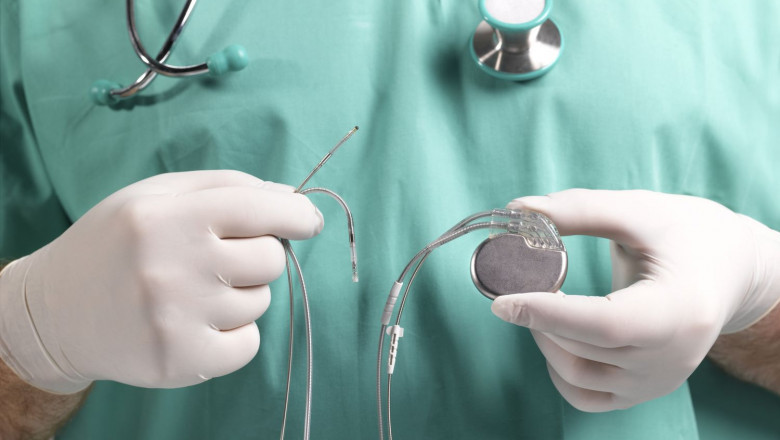views
The global cardiac surgery devices market has been witnessing substantial growth due to the rising incidence of cardiovascular diseases (CVDs), increasing demand for minimally invasive procedures, and technological advancements in medical devices. As heart diseases remain a leading cause of mortality worldwide, the need for effective and safe surgical interventions continues to grow. Cardiac surgery devices, which include heart-lung machines, beating heart surgery systems, cardiac ablation devices, and prosthetic heart valves, play a vital role in enhancing surgical outcomes and patient survival rates.
Market Drivers
One of the primary drivers of the cardiac surgery devices market is the increasing prevalence of cardiovascular conditions such as coronary artery disease, congenital heart defects, and heart valve disorders. According to the World Health Organization (WHO), cardiovascular diseases account for nearly 17.9 million deaths globally each year, prompting the urgent need for advanced cardiac care.
An aging global population further contributes to market growth. Elderly individuals are at a higher risk of developing heart-related conditions, increasing the demand for cardiac surgeries and the devices that support them. In developed nations, improved healthcare infrastructure and insurance coverage also encourage the adoption of surgical interventions.
Technological innovations are significantly shaping the cardiac surgery landscape. Companies are developing next-generation devices that enhance surgical precision, reduce operation time, and minimize patient trauma. Innovations such as minimally invasive cardiac surgery (MICS) systems, 3D-printed heart valves, and robotic-assisted surgical devices are expected to transform traditional procedures, making them safer and more efficient.
Market Segmentation
The cardiac surgery devices market is segmented based on product type, application, end user, and region.
-
By Product Type: The market is categorized into heart-lung machines, cardiopulmonary bypass equipment, cardiac ablation devices, perfusion disposables, and others. Among these, cardiac ablation devices are gaining popularity due to their effectiveness in treating arrhythmias without major surgery.
-
By Application: Applications include coronary artery bypass grafting (CABG), heart valve repair and replacement, and congenital heart defect procedures. CABG remains one of the most commonly performed cardiac surgeries globally.
-
By End User: Hospitals, specialty cardiac centers, and ambulatory surgical centers are the primary end users. Hospitals dominate the segment due to the availability of skilled surgeons and comprehensive post-operative care facilities.
Regional Insights
North America holds the largest share of the global cardiac surgery devices market, driven by high healthcare expenditure, favorable reimbursement policies, and widespread adoption of advanced medical technologies. The presence of major market players such as Medtronic, Abbott Laboratories, and Boston Scientific further strengthens the region’s dominance.
Europe is another significant market, particularly in countries like Germany, France, and the UK. Increased awareness about cardiac health and supportive government initiatives contribute to regional growth.
The Asia-Pacific region is anticipated to witness the fastest growth during the forecast period. Rapid urbanization, a growing middle-class population, and an increasing burden of lifestyle-related diseases are creating substantial opportunities. Countries such as China, India, and Japan are investing heavily in healthcare infrastructure, which bodes well for the cardiac surgery devices market.
Challenges and Restraints
Despite the promising growth trajectory, the market faces several challenges. The high cost of cardiac surgery devices and procedures may limit adoption in developing regions. In addition, stringent regulatory frameworks and lengthy approval processes for new devices can hamper market entry for emerging players.
Moreover, the shortage of trained cardiac surgeons in many regions poses a significant barrier. As cardiac procedures are highly specialized, the availability of skilled professionals is critical to ensuring successful outcomes.
Future Outlook
The cardiac surgery devices market is poised for significant expansion, supported by continuous innovation, increased healthcare access, and rising demand for efficient surgical solutions. Market players are focusing on strategic collaborations, mergers and acquisitions, and product development to gain a competitive edge.
The integration of artificial intelligence and machine learning in surgical planning and device operation is expected to further enhance surgical accuracy and reduce complication rates. Additionally, growing interest in personalized medicine and patient-specific devices offers new avenues for innovation and patient care improvement.
In conclusion, the cardiac surgery devices market presents immense opportunities for stakeholders across the healthcare ecosystem. With technological evolution and a growing patient population, the industry is set to play a pivotal role in combating cardiovascular diseases and improving global health outcomes.






















Comments
0 comment